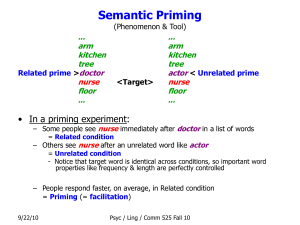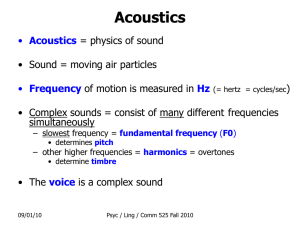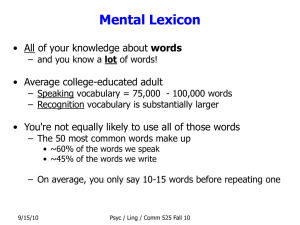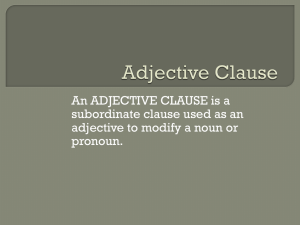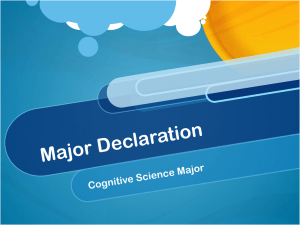Sentence Comprehension Lecture 101310
advertisement
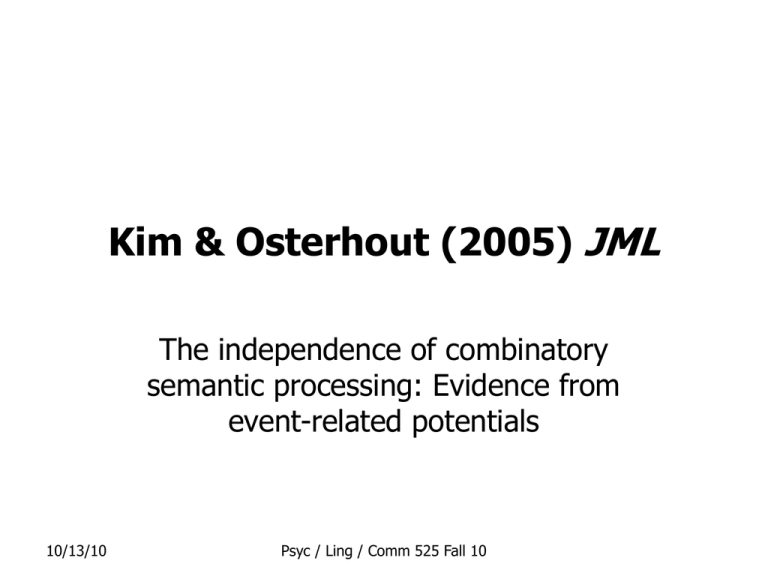
Kim & Osterhout (2005) JML The independence of combinatory semantic processing: Evidence from event-related potentials 10/13/10 Psyc / Ling / Comm 525 Fall 10 Background • Everyone believes – N400 reflects semantic processing difficulty – P600 reflects form-related processing difficulty • However, 2 studies have found P600 when they expected to find N400 – Kolk et al. (2003) found P600 at joeg • De vos die op de stropers joeg … • The fox that the poachers hunted … • = The fox that hunted the poachers … – Kuperberg et al. (2003) also found P600 at eat • For breakfast, the eggs would only eat … • In both cases, there was a noun that was plausible in some role of the verb’s event, just not the role its position indicated it had 10/13/10 Psyc / Ling / Comm 525 Fall 10 Experiment 1 - Stimuli • Active Control – The hungry boy was DEVOURING the cookies. • Passive Control – The hearty meal was DEVOURED by the kids. • Anomaly – The hearty meal was DEVOURING the kids. 10/13/10 Psyc / Ling / Comm 525 Fall 10 Procedures/Design • Sentences presented word-by-word centrally • SOA = 650 msec (slow!) • End-of-sentence acceptability judgments • Expt 1 – N = 24 – 96 sets of 3 sentence versions (32) – 107 distractors, some sem anom, some ungramm • Numbers varied across lists to make acceptability ~50/50 – 96 + 107 – 203 trials (58% acceptable, 42% unacceptable) • Expt 2 – N = 29 – 96 sets of 3 sentence versions (32) – 112 distractors, some sem anom, some ungramm • Numbers varied across list to make acceptability ~50/50 – 96 + 112 = 208 (50% acceptable, 50% unacceptable) 10/13/10 Psyc / Ling / Comm 525 Fall 10 Experiment 1 - Results P600 P600 10/13/10 Psyc / Ling / Comm 525 Fall 10 Experiment 1 - Discussion • Why does “The hearty meal was devouring…” evoke P600 rather than N400? – Because hearty meal can play SOME thematic role in a devouring event? – Maybe the fact that hearty meal fits so well with devouring makes the processing system think there’s a grammatical error, like the wrong inflection on devouring, rather than a semantic anomaly 10/13/10 Psyc / Ling / Comm 525 Fall 10 Experiment 2 - Stimuli • Passive Control – The hearty meal was DEVOURED … • No-attraction Violation – The dusty tabletops were DEVOURING … • Attraction Violation – The hearty meal was DEVOURING … 10/13/10 Psyc / Ling / Comm 525 Fall 10 Experiment 2 - Results N400 10/13/10 Psyc / Ling / Comm 525 Fall 10 Experiment 2 - Discussion • Argue that these results show that – Semantic processing can “drive” sentence comprehension – Rather than always having to wait for structural processing to give the relationships among words before their semantic combination can proceed 10/13/10 Psyc / Ling / Comm 525 Fall 10 The Role of Prosody • Embedded Clause / Direct Object sentences can be disambiguated with prosodic phrasing • Acoustic correlates: – – – – – 10/13/10 Pause Pre-boundary lengthening Pitch contour Pitch reset … Psyc / Ling / Comm 525 Fall 10 How does this kind of prosodic boundary marking influence sentence interpretation? • Example of DO Prosody – The basketball star accepted the contract… …because it paid so well. Example of Clause Prosody - The basketball star accepted … … the contract requires him to play every game. 10/13/10 Psyc / Ling / Comm 525 Fall 10 Do speakers actually produce different prosody in DO and Clause structures? Gahl & Garnsey (2004) 10/13/10 Psyc / Ling / Comm 525 Fall 10 Boundaries marked more strongly when Structure not consistent with Verb Bias 10/13/10 Psyc / Ling / Comm 525 Fall 10 Using ERPs to Study Prosody • On-line nature of ERPs especially good for investigating immediate effects of prosody during spoken sentence processing • Steinhauer, Alter, & Friederici (1999) – Discovered a positive ERP component at prosodic boundaries – “Closure Positive Shift” (CPS) 10/13/10 Psyc / Ling / Comm 525 Fall 10 Closure Positive Shift (CPS) 10/13/10 Psyc / Ling / Comm 525 Fall 10 Steinhauer, Alter & Friederici (1999) CPS • Demonstrated CPS with – – – – – – Delexicalized speech (Steinhauer & Friederici 2001) Jabberwocky sentences (Pannekamp et al. 2005) Pseudosentences (Pannekamp et al. 2005) Hummed sentences (Pannekamp et al. 2005) Musical phrases (Knösche et al. 2005) Commas in orthographic stimuli (Steinhauer 2003; described in Frazier, Carlson, & Clifton 2006) • But only for people with good knowledge of comma rules 10/13/10 Psyc / Ling / Comm 525 Fall 10 CPS Studies from Other Labs • Kerkhofs et al. (2007) – Embedded stimuli in discourses – Found smaller CPS when discourse made a boundary highly predictable – Casts some doubt on CPS as “pure prosody” processing 10/13/10 Psyc / Ling / Comm 525 Fall 10 ERP Prosody Study (Jackson, Patel, & Garnsey, 2010) • Structure of sentence completion – Beginnings ambiguous The basketball star accepted the contract… – Direct Object (DO) ending …because it paid so well. – Embedded Clause (Clause) ending …requires him to play every game. • All Verbs DO-Bias & Critical Nouns plausible as DO – To maximize garden-pathing, to have the best possible chance to see whether prosody can prevent it 10/13/10 Psyc / Ling / Comm 525 Fall 10 Stimuli • Prosodic Phrasing – Direct Object (DO) phrasing [ The basketball star accepted the contract ] [ because it paid so well. ] – Embedded Clause (EC) phrasing [ The basketball star accepted ] [ the contract requires him to play every game. ] 10/13/10 Psyc / Ling / Comm 525 Fall 10 More Stimuli & Design • Fully crossed • Matching conditions: – DO ending + DO prosody [ The basketball star accepted the contract ] [ because it paid so well. ] – Clause ending + Clause prosody [ The basketball star accepted ] [ the contract requires him to play every game. ] 10/13/10 Psyc / Ling / Comm 525 Fall 10 More Stimuli & Design • Mismatching conditions: – Clause ending + DO prosody [ The basketball star accepted the contract ] [ requires him to play every game. ] – DO ending + Clause prosody [ The basketball star accepted ] [ the contract because it paid so well. ] 10/13/10 Psyc / Ling / Comm 525 Fall 10 Materials Construction • “Natural” recordings made in all four conditions. • From these, spliced: – One beginning per prosody condition – One ending per structure condition • Splice locations counterbalanced to ensure equivalent (un)naturalness across conditions 10/13/10 Psyc / Ling / Comm 525 Fall 10 Splicing example • Beginnings – DO prosody – Clause prosody • Endings – DO ending – Clause ending • Results – – – – 10/13/10 DO prosody, DO ending Clause prosody, DO ending DO prosody, Clause ending Clause prosody, Clause ending Psyc / Ling / Comm 525 Fall 10 ERP Data Analysis Predictions: – CPS when there’s a boundary compared to no boundary – No P600 when prosody could prevent garden-pathing Limitation on data analysis: Can’t directly compare across prosodic conditions at the critical disambiguating word (requires or because) – Because in DO Prosody, CPS directly precedes it, but not in SC Prosody (CPS earlier, after main verb accepted) – So compare difference waves across Structures within Prosody • ERP starting at end of pre-boundary word minus ERP starting at end of same word without boundary shows CPS 10/13/10 Psyc / Ling / Comm 525 Fall 10 Structure Matches Boundary Location (collapsed over Clause & DO-Structure) Difference Waves: Boundary minus No-Boundary 0 msec = end of “pre-boundary” word 10/13/10 Psyc / Ling / Comm 525 Fall 10 Structure MISmatches Boundary Location (collapsed over Clause & DO-Structure) Difference Waves: Boundary minus No-Boundary 0 msec = end of “pre-boundary” word 10/13/10 Psyc / Ling / Comm 525 Fall 10 When Structure Matches Boundary Location 10/13/10 Psyc / Ling / Comm 525 Fall 10 When Structure MISmatches Boundary Location 10/13/10 Psyc / Ling / Comm 525 Fall 10 Next Steps • Manipulate Verb Bias • Manipulate Plausibility – Would a Boundary before a Noun that’s implausible as a DO prevent N400 effects on Noun? • The referees warned // the game would probably go into overtime. 10/13/10 Psyc / Ling / Comm 525 Fall 10 Summing Up • Multiple sources of information constrain sentence interpretation – Lexical bias, plausibility, prosody … • The sources interact – BUT some provide stronger constraints – And/or are available more rapidly – And thus drive the interaction • And this all happens really fast! 10/13/10 Psyc / Ling / Comm 525 Fall 10
